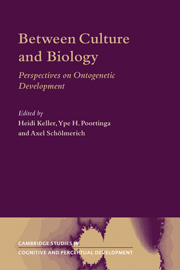Book contents
- Frontmatter
- Contents
- List of figures
- List of tables
- Notes on contributors
- Acknowledgements
- Introduction
- Part I Setting the scene
- Part II Perspectives on development informed by culture
- Part III Perspectives on development drawing from the universal and the specific
- Part IV Perspectives on development informed by evolutionary thinking
- Part V Metaperspectives
- 13 Culture and development
- 14 Behaviour–culture relationships and ontogenetic development
- 15 Paradigms revisited: from incommensurability to respected complementarity
- 16 Epilogue: conceptions of ontogenetic development; integrating and demarcating perspectives
- Author index
- Subject index
- Cambridge Cultural Social Studies
15 - Paradigms revisited: from incommensurability to respected complementarity
Published online by Cambridge University Press: 22 September 2009
- Frontmatter
- Contents
- List of figures
- List of tables
- Notes on contributors
- Acknowledgements
- Introduction
- Part I Setting the scene
- Part II Perspectives on development informed by culture
- Part III Perspectives on development drawing from the universal and the specific
- Part IV Perspectives on development informed by evolutionary thinking
- Part V Metaperspectives
- 13 Culture and development
- 14 Behaviour–culture relationships and ontogenetic development
- 15 Paradigms revisited: from incommensurability to respected complementarity
- 16 Epilogue: conceptions of ontogenetic development; integrating and demarcating perspectives
- Author index
- Subject index
- Cambridge Cultural Social Studies
Summary
More than twenty years ago I applied Kuhn's (1970a) concept of paradigms to cross-cultural psychology (Eckensberger, 1979). This early paper was elaborated and extended at several later occasions (Eckensberger, 1995; Eckensberger and Burgard, 1983; Eckensberger and Keller, 1998; Eckensberger, Krewer and Kasper, 1984). In these contributions different paradigms in cross-cultural psychology were not just distinguished; rather cross-cultural psychology was explicitly used as a framework for the evaluation of existing paradigms in psychology in general. This earlier work addressed not only cross-cultural psychologists, but all psychologists – as does the present chapter.
After introducing some distinctions in philosophy of science to provide a basis for my position, discussion of the usefulness of paradigms and recent trends in psychology leads to the specification of four perspectives (paradigms). The elucidation of their interrelationships leads to my conclusion that cultural psychology appears to be a ‘metatheory’, and not just a sub-branch of psychology, and that the ethic of respected complementarity in psychology is essential for a more complete and differentiated understanding of human beings.
Introductory remarks on philosophy of science
Kuhn's approach: some comments
In psychology the term ‘paradigm’ has become a part of everyday language, since T. S.Kuhn (1970a) published his short but influential Structure of scientific revolutions.
- Type
- Chapter
- Information
- Between Culture and BiologyPerspectives on Ontogenetic Development, pp. 341 - 383Publisher: Cambridge University PressPrint publication year: 2002
- 7
- Cited by

